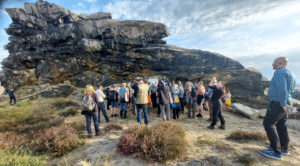Podcast INQUA 2027 India
Quaternary is the age when modern recognisable humans started inhabiting this planet.
All over the world scientists are engaged in studying various aspects of human evolution. Once every 4 years scientists from all across the Globe gather at one place and exchange their research, discoveries and views. In 2027 Lucknow (India) has the honour of hosting this congress.
Through this podcast, accompany Veraa on an amazing journey about human evolution, changing climate and reorganisation of environments.
To listen the podcast:
Season 3 – Tsunami tales from the west coast of India
Today, we travel into a lesser-known but fascinating narrative – the tales of tsunami from the west coast of India facing the Arabian Sea.
For centuries, the Arabian Sea has been seen as calmer than its eastern counterpart, the Bay of Bengal. While the eastern coast of India has witnessed devastating tsunamis, particularly in 2004, the western coast—facing the Arabian Sea—has often been considered relatively safe. But history, geology and archaeology suggest otherwise.
Hidden in ancient records, buried beneath the surface, and whispered through oral communications, there are signs that the Arabian Sea, too, has stirred violently in the past.
News News
View moreLatest developments Podcast INQUA India 2027
Podcast INQUA India 2027Quaternary is the age when modern recognisable humans started inhabiting this planet. All over the world scientists are engaged in studying various aspects of human evolution. Once every 4 years scientists from all across the…
 Podcast INQUA India 2027
Podcast INQUA India 2027Quaternary is the age when modern recognisable humans started inhabiting this planet. All over the world scientists are engaged in studying various aspects of human evolution. Once every 4 years scientists from all across the…
 New QP Issue Out!
New QP Issue Out!QP Issue 39 December 2025 is now available online!
 Podcast INQUA India 2027
Podcast INQUA India 2027Quaternary is the age when modern recognisable humans started inhabiting this planet. All over the world scientists are engaged in studying various aspects of human evolution. Once every 4 years scientists from all across the…
 Quaternary International Editorial Team Update
Quaternary International Editorial Team UpdateWarm greetings with gratitude to the outgoing Associate Editors!
 Paleopedology newsletter Issue 36
Paleopedology newsletter Issue 36Paleopedology newsletter Issue 36, September 2025 is now out!


